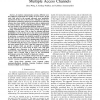Free Online Productivity Tools
i2Speak
i2Symbol
i2OCR
iTex2Img
iWeb2Print
iWeb2Shot
i2Type
iPdf2Split
iPdf2Merge
i2Bopomofo
i2Arabic
i2Style
i2Image
i2PDF
iLatex2Rtf
Sci2ools
134
click to vote
TIT
2008
2008
Error Exponent Regions for Gaussian Broadcast and Multiple-Access Channels
In modern communication systems, different users have different requirements for quality of service (QoS). In this work, QoS refers to the average codeword error probability experienced by the users in the network. Although several practical schemes (collectively referred to as unequal error protection schemes) have been studied in the literature and are implemented in existing systems, the corresponding performance limits have not been studied in an information-theoretic framework. In this paper an information-theoretic framework is considered to study communication systems which provide heterogeneous reliabilities for the users. This is done by defining individual probabilities of error for the users in the network and obtaining the fundamental tradeoffs of the corresponding error exponents. In particular, we quantify the reliability tradeoff by introducing the notion of error exponent region (EER), which specifies the set of error exponent vectors that are simultaneously achievable ...
| Added | 15 Dec 2010 |
| Updated | 15 Dec 2010 |
| Type | Journal |
| Year | 2008 |
| Where | TIT |
| Authors | Lihua Weng, S. Sandeep Pradhan, Achilleas Anastasopoulos |
Comments (0)

